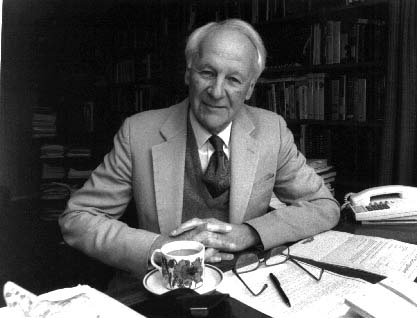I suspect that by now almost everyone who reads this blog will already know that John Stott passed away two days ago.
It is impossible to overstate the influence Stott had on the evangelical world in the 20th Century. I thought I would here share some quotes and a round up of useful links form around the net. John Stott Ministries has a website where you can read more about him. Third Way have a comprehensive interview with Stott from 2005.
John Piper’s personal reflection on Stott’s life is probably the best place to start:
“John Stott turned the words of Bible sentences into windows onto glorious reality by explaining them in clear, compelling, complete, coherent, fresh, silly-free, English sentences . . Yes! This is what I was starving for and didn’t even know it. Amazing! Someone is telling me what these sentences mean! Someone is making light shine on these words. It is shining so bright, I can’t sleep in this light! I am waking up from decades of dull dealing with God’s word. Thank you. Thank you. I could care less if you tell me any stories. I want to know what God means by these words!.”
Justin Taylorwrote a very good article about Sott which included the video I have also embedded below. He quoted John Stott’s final published words, at the end of his last book, The Radical Disciple, published in 2010:
As I lay down my pen for the last time (literally, since I confess I am not computerized) at the age of eighty-eight, I venture to send this valedictory message to my readers. I am grateful for your encouragement, for many of you have written to me. Looking ahead, none of us of course knows what the future of printing and publishing may be. But I myself am confident that the future of books is assured and that, though they will be complemented, they will never be altogether replaced. For there is something unique about books. Our favorite books become very precious to us and we even develop with them an almost living and affectionate relationship. Is it an altogether fanciful fact that we handle, stroke and even smell them as tokens of our esteem and affection? I am not referring only to an author’s feeling for what he has written, but to all readers and their library. I have made it a rule not to quote from any book unless I have first handled it. So let me urge you to keep reading, and encourage your relatives and friends to do the same. For this is a much neglected means of grace. . . . Once again, farewell! (pp. 136-137)
Here are a few quotes from John Stott that various people have shared on Twitter that give a good insight into the way he thought:
- “In the real world of pain, how could one worship a God who was immune to it?”
- “Worship without theology is bound to degenerate into idolatry. On the other hand, there should be no theology without doxology.”
- “It is impossible to be truly converted to God without being thereby converted to our neighbor.”
- “Before we can begin to see the cross as something done for us, we have to see it as something done by us.”
- “Every Christian should be both conservative and radical; conservative in preserving the faith and radical in applying it.”
The Christian Post quoted a colleague, “I’m not certain that John Stott would want people to remember him,” and gives a detailed account of his life.
Christianity Today has a very helpful article, which includes the following excerpt:
“Conservative evangelicals were a despised minority when Stott was ordained, without a single bishop in the Church of England. In response, Stott showed his ingenuity as a social entrepreneur. He was never one to keep his convictions to himself, nor to consider a situation hopeless. Instead, he fostered organizations meant to encourage younger evangelical clergy, and he helped organize and renew evangelical conferences.
Most of all, he served as a model of confidence and intellectual strength. “I remember reading his books as a young student,” says Old Testament scholar Chris Wright, whom Stott later chose to lead Langham Partners International, the Majority World ministry of biblical scholarship and preaching that Stott started as a result of his global travels. “They were so clearly argued you felt that you had a case.”
Stott believed in the mind as a gift from God. In an evangelical world tempted to rely on proof texts and emotive stories, Stott drilled down deep into Scripture to display its power. Many people, hearing Stott preach for the first time, said they had never heard the Bible expounded with such clarity and depth. His passion was to learn what God said, and to let it shape life. Stott’s preaching and writing renewed faith in the inspiration of Scripture—not only because he defended it, but because he displayed it.
At the same time, his practice of evangelism demonstrated that “plain, ordinary Christianity” could appeal to all classes of people. What evangelicals most treasured—the person and work of Jesus Christ, and the Scriptures that testified to them—he showed to be potent resources for winning the world. Largely through Stott’s leadership, British evangelicalism was transformed from a defensive backwater to an engaged and significant movement.”
Tim Challies shares some highlights from Twitter, while the Gospel Coalition posted an article from a British Minister that states, “To ministers like myself, perhaps it is John Stott’s concern for careful, faithful and meticulous exposition of the Scriptures that will be his lasting legacy. For him, preaching was not just an ‘add on’ to the busy life of a minister but a huge privilege and a solemn responsibility.”
British Newspapers have posted obitaries including the following:
- The Guardian: “Though the name of the Rev John Stott, who has died at the age of 90, rarely appeared in the UK national press, in April 2005 Time Magazine placed him among the world’s top 100 major influencers.” (This is not the time for us to speak about the perenial bias of the media against Christians, but I do hope that the media will pay attention to other evangelical voices God will raise up. ) The piece goes on, “He insisted that Christians should engage in “double listening” – to the word of God, and to the world around them – and apply their biblical faith to all the pressing issues of contemporary culture. “
- The Telegraph: “When Stott was ordained at the end of the Second World War, the evangelical wing of the Church of England was small, introverted, backward-looking and divided. Fifty years later there was an evangelical Archbishop of Canterbury; several diocesan bishops of similar convictions; and in all parts of England a network of dynamic churches inspired by the evangelical spirit. “
There is an official John Stott Memorial that has been set up that includes an online memorial book. Notable quotes from that page include:
- Billy Graham who described Stott as “the most respected clergyman in the world today”
- New York Times columnist David Brooks who wrote that if evangelicals chose a pope, they would choose him.
- Don from Indonesia, “Through his books, I felt he was like my spiritual father. Sad that he’s now gone but also glad as he is now receiving the prize and also for his everlasting legacy.”
- Phil, who served on staff with Stott in the 1970s, “Uncle John leaves this world a much better place due to his humble, dedicated service to God.”













